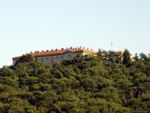Difference between revisions of "Template:Featured"
m (add link) |
|||
| Line 4: | Line 4: | ||
</div> | </div> | ||
<!--nb. portrait images at ~100px, landscape images at ~200px--> | <!--nb. portrait images at ~100px, landscape images at ~200px--> | ||
| − | [[Image: | + | [[Image:Halki.jpg|left|150px]]The '''''[[Holy Theological School of Halki]]''''' was established to meet the educational needs of the Patriarchate of Constantinople as well as of the Orthodox Church in general. Since its establishment in 1844, the school has passed through a number of organizations. Initially, between 1844 and 1899 the school operated with four high school grades and three theological grades. During the period of 1899 and 1923 the high school grades were discontinued and the school functioned as an Academy of five grades. Between 1923 and 1951 the school reactivated the high school grades as originally established in 1844. In 1951 the educational program was again modified to consisted of three high school grades and four theological grades. This arrangement continued until 1971 when the school was closed after passage of a law that prohibited operation of privately owned schools of higher education in Turkey. It has remained closed since although the facilities have been visited and used by Orthodox friends and faithful. The Patriarchate has hoped that promises from the Turkish government to allow the seminary to reopen would be enacted. |
| − | |||
| − | + | '''''Recently featured:''''' [[Alexander Nevsky]], [[Episcopi vagantes]], [[Joseph the Hesychast]], [[Eucharist]], [[Alexander (Nemolovsky) of Brussels]], [[John the Merciful]], [[John (Shahovskoy) of San Francisco]], [[Gabrielia (Papayannis)]], [[Fall of Constantinople]], [[Seraphim of Sarov]]. ''Newly [[:Category:Featured Articles|featured articles]] are presented on '''Saturdays'''.'' | |
| − | '''''Recently featured:''''' [[Episcopi vagantes]], [[Joseph the Hesychast]], [[Eucharist]], [[Alexander (Nemolovsky) of Brussels]], [[John the Merciful]], [[John (Shahovskoy) of San Francisco]], [[Gabrielia (Papayannis)]], [[Fall of Constantinople]], [[Seraphim of Sarov]]. ''Newly [[:Category:Featured Articles|featured articles]] are presented on '''Saturdays'''.'' | ||
Revision as of 20:25, December 16, 2006
Recently featured: Alexander Nevsky, Episcopi vagantes, Joseph the Hesychast, Eucharist, Alexander (Nemolovsky) of Brussels, John the Merciful, John (Shahovskoy) of San Francisco, Gabrielia (Papayannis), Fall of Constantinople, Seraphim of Sarov. Newly featured articles are presented on Saturdays.
